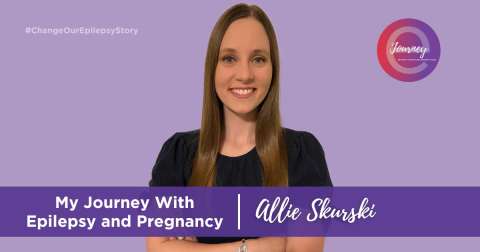My Journey With Epilepsy and Pregnancy

By Allie Skurski , Illinois
Person with EpilepsyThursday, November 2, 2023
I was diagnosed with atypical absence seizures as a child. I was having hundreds per day and not knowing. To my parents and teachers, it could be described as a "deer in the headlights" look on my face. I constantly battled feeling different from other kids because I couldn't participate in many physical education activities in school. I felt I was not as smart as other children in class because my seizures caused me to miss so much class instruction. I never wanted to share what I was going through with the other kids. I received the help I needed from a phenomenal pediatric neurologist and was able to get these seizures under control and eventually become seizure-free for 14 years.
Then, in 2020, I suffered my first tonic-clonic seizure at home in my husband's arms. As an adult, after having a tonic-clonic seizure and not being allowed to drive for six months, I faced the need to rely on others for help in several areas, both physically, emotionally, and mentally. It made me feel like a child again, dependent on others to drive me to work and doctor's appointments or constantly monitor me. I missed out on typical life events such as a couple of bachelorette parties due to those types of events partaking in an atmosphere where strobe lights were present.
From the recommendation of my previous neurologist, I found another incredible neurologist to guide me through epilepsy as an adult. My doctor specializes in women with epilepsy and successfully helped me remain seizure-free for three years (and counting!) and, during that time, guided me through my first pregnancy with no complications to myself or the baby. I now have a healthy baby girl and continue to be seizure-free.
One of my most recent challenges was navigating postpartum with epilepsy. I knew I would be highly susceptible to having another seizure as my hormones fluctuated, the countless nights of sleep deprivation, and the stress of caring for a newborn for the first time. All triggers that many individuals with epilepsy face. There was constant fear of knowing a seizure could happen at any moment, let alone while I was holding the baby.
My parents and husband were constantly by my side for my entire postpartum period before I returned to work. They allowed me to take naps whenever I needed to battle sleep deprivation, and they monitored me while I bathed the baby, knowing my safety was also important. One of the many things many individuals with epilepsy cannot do is take a bath by themselves. I had to learn to be okay with needing constant supervision while caring for my child.
After going through a second journey with epilepsy, thinking I had outgrown seizures as a child, my mindset changed. I felt more comfortable telling friends and coworkers what I had experienced. In my adulthood, I began to understand it's okay to ask for help and it's okay to prioritize yourself by limiting exposure to your triggers. With the help of family, friends, and coworkers, I have a great support system. They have all been eager to learn seizure first aid and, most importantly, be there for me whenever I need their help.
Surprisingly, several people I know were willing to learn seizure first aid. In one instance, someone I know who learned seizure first aid was the only one who knew what to do when their neighbor's child was experiencing a seizure. This calmed the child's mother down and gave her a sense of ease until paramedics arrived to help. I advise anyone to learn seizure first aid because you never know who you might be able to help.
Epilepsy has impacted my life for as long as I can remember. It required me to learn how to navigate obstacles as a child and then again as an adult with different responsibilities. My doctor gave me the best description of my epilepsy, which I continue to share with others as it can be hard to understand sometimes. She said, "Epilepsy is a condition, and seizures are a symptom of that condition. We can treat the symptoms, but you will always have epilepsy." This way of describing epilepsy has allowed me to come to terms with it and how it impacts my life.
I will never give up, and I'm honored to share my story in hopes that it helps 1 or 1,000 people. Don't be afraid to ask for help. Epilepsy is a journey that leads you to become stronger in who you are. Surround yourself with good people and a great team of doctors who will be there for you every step of the way. You are not alone; you are a unique 1 in 26!
Reviewed By: Sara Wyen
